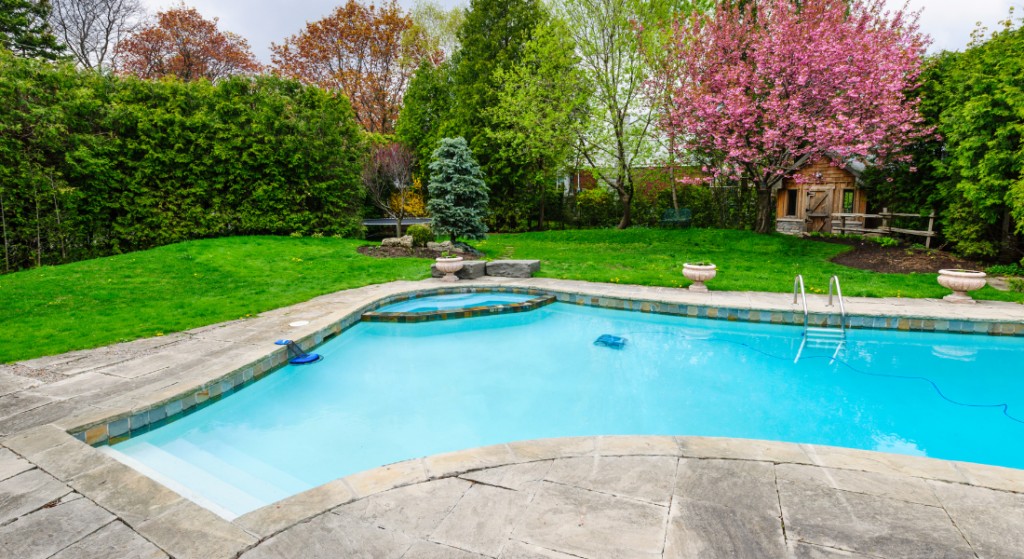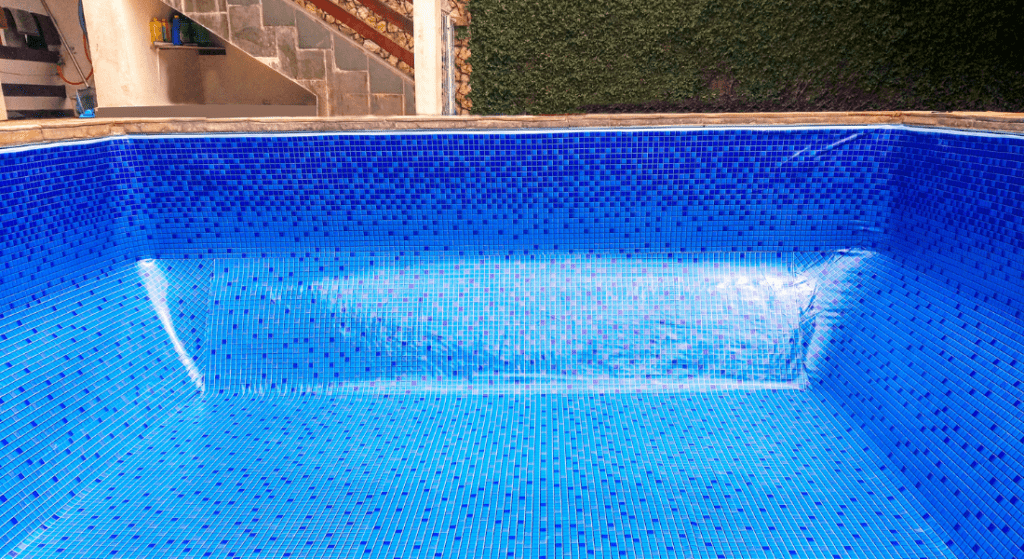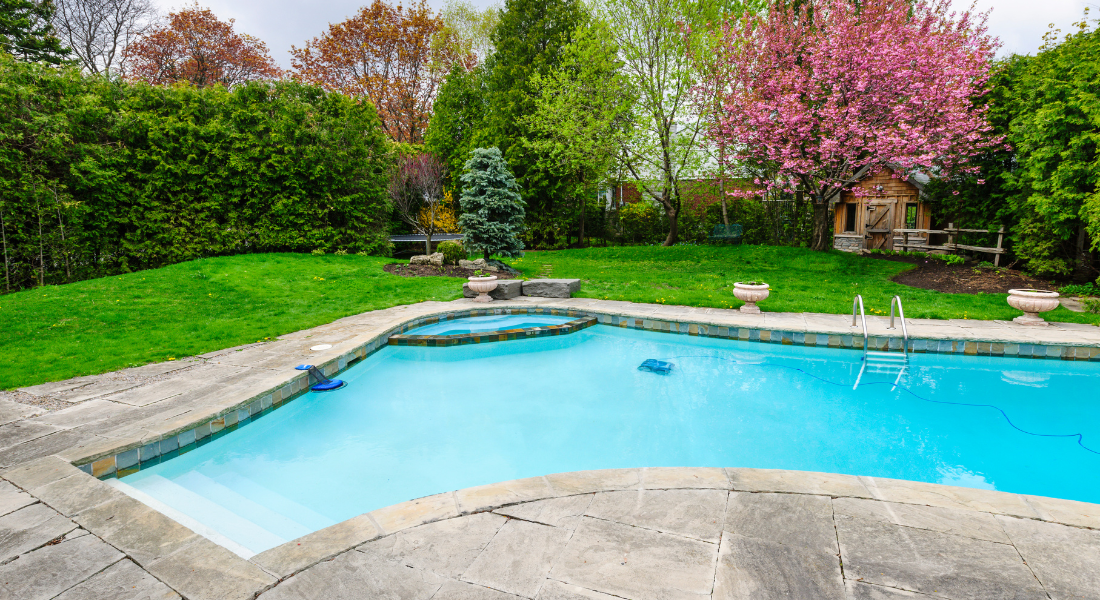Exploring the Pros and Cons of Different Inground Pool Materials
In the realm of home luxuries, few things rival the allure of a sparkling inground pool. A backyard oasis, a haven for relaxation and recreation, a symbol of leisure and luxury—these are just a few of the associations that come to mind when we think of inground pools. But behind the glossy facade of the shimmering water lies a critical decision: what material should your pool be made of?
In this comprehensive guide, we’ll dive into the world of inground pools, exploring the pros and cons of the three types of inground pools’ most common materials: fiberglass, concrete, and vinyl liner. Whether you’re dreaming of your own private paradise or considering an upgrade to your existing pool, understanding the characteristics of each material is crucial. So let’s take the plunge and explore the depths of inground pool materials.

Fiberglass Swimming Pool: Strengths and Weaknesses
Fiberglass pools have gained popularity in recent years due to their durability, low pool maintenance requirements, and quick installation process. Unlike traditional concrete pools, which are built on-site, fiberglass pools are manufactured off-site and installed as a single piece. This streamlined process often translates to shorter installation times and fewer disruptions to your backyard landscape.
One of the primary advantages of fiberglass pools is their smooth, non-porous surface, which resists algae growth and reduces the need for harsh chemicals. Additionally, fiberglass pools are less prone to staining and require minimal ongoing maintenance compared to concrete pools.
However, fiberglass pools also have their drawbacks. They are typically more expensive upfront compared to vinyl liner pools, and their size and shape options may be limited by manufacturing constraints. Furthermore, while fiberglass pools are known for their durability, they can be more susceptible to cracking and fading over time compared to concrete.

Concrete Pools Pros and Cons
Concrete pools, also known as gunite or shotcrete pools, have long been a popular choice for homeowners seeking customization and durability. Unlike fiberglass and vinyl liner pools, which come in pre-fabricated shapes and sizes, concrete pools can be completely customized to fit your specific design preferences and backyard layout.
One of the key advantages of concrete pools is their longevity. With proper maintenance and occasional resurfacing, a well-built concrete pool can last for decades. Additionally, concrete pools offer unparalleled flexibility in terms of design features such as custom shapes, water features, and built-in spa areas.
However, concrete pools also have their drawbacks. The installation process for concrete pools is more labor-intensive and time-consuming compared to fiberglass and vinyl liner pools, often requiring several weeks or even months to complete. Additionally, concrete pools can be more prone to surface staining, cracking, and algae growth if not properly maintained.

Vinyl Pools: Affordability and Flexibility
Vinyl liner pools offer a middle ground between fiberglass and concrete, combining the affordability of vinyl with the flexibility of custom designs. These pools feature a reinforced vinyl liner that is installed over a frame structure, providing a smooth, watertight surface for swimming.
One of the primary advantages of vinyl liner pools is their affordability. In general, vinyl liner pools tend to be less expensive upfront compared to fiberglass and concrete, making them an attractive option for budget-conscious homeowners. Additionally, vinyl liners come in a variety of patterns and colors, allowing for customization without the hefty price tag.
However, vinyl liner pools also have their drawbacks. The vinyl liner itself is susceptible to punctures and tears, which can lead to costly repairs or replacement over time. Additionally, vinyl liner pools may require more frequent maintenance compared to fiberglass and concrete, as the liner can be prone to fading, wrinkling, and algae growth.
Inground Pools vs. Above-Ground Pools: Choosing the Right Fit
When it comes to installing a swimming pool, deciding between an in-ground pool and an above-ground pool is key. Both options offer unique benefits and drawbacks worth considering.
Inground pools exude luxury, seamlessly blending into your backyard for a sophisticated look. Customization options abound, from shape and size to materials used. However, they come with a higher price tag and longer installation process, requiring more maintenance to keep them pristine.
Above-ground pools offer a more budget-friendly option that’s quick to install. They’re easier to maintain and winterize but may lack the visual appeal and permanence of inground pools.
Making the Right Choice for Your Home
In conclusion, the decision of which inground pool material to choose ultimately depends on your specific needs, budget, and preferences. Fiberglass pools offer durability and low maintenance but come with a higher upfront cost. Concrete pools provide unparalleled customization but require a significant investment of time and money. Vinyl liner pools offer affordability and flexibility but may require more frequent maintenance and repairs.
Before making your decision, carefully consider the pros and cons of each material, and consult with a reputable pool builder to explore your options. With the right information and guidance, you can create the perfect backyard oasis that brings years of enjoyment to you and your family.
Key Takeaways
- Fiberglass pools offer durability and low maintenance but can be more expensive upfront.
- Concrete pools provide customization options but require a longer installation process and ongoing maintenance.
- Vinyl liner pools are affordable and flexible but may require more frequent maintenance and repairs.
- Inground pool installation offers luxury and customization. It seamlessly blends into your backyard for a sophisticated look. However, it comes with higher costs and maintenance needs.
- Above-ground pools are budget-friendly and quick to install. They are easier to maintain and winterize. But, they may lack the visual appeal of inground options.
- Consider your budget, design preferences, and long-term maintenance needs when choosing an inground pool material.
In the end, the best inground pool material for your home is the one that meets your needs and fits your lifestyle. Whether you opt for the sleek sophistication of fiberglass, the customizable elegance of concrete, or the budget-friendly versatility of vinyl liner, your inground pool is sure to become a cherished centerpiece of your outdoor living space.


